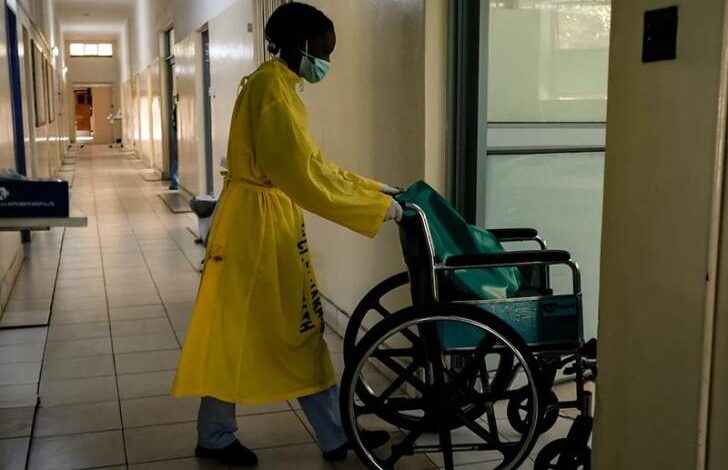Zimbabweans among top 5 most exploited nationals in UK

A LATEST situational report by a non-profit organisation in the United Kingdom (UK) has painted a gloomy picture that reeks of massive exploitation, bordering on slavery, of migrants from developing countries, including Zimbabwe.
Leading the pack of abused nationals were Indians with a staggering 147 victims, 45 Zimbabweans, 25 Nigerians, 22 Ghanaians and 14 Tanzanians were saved from the jaws of bondage.
The dossier titled “Who Cares?” is a review of reports of exploitation in the care sector compiled by Unseen, which is a helpline working towards a world without slavery. It provides safe houses and support in the community for survivors of trafficking and modern slavery.
The report says abuse and exploitation of workers are evident in all sectors of the UK economy although the risks were higher in the care sector than in other sectors due to the significant use of temporary labour and poor employment conditions.
Throughout 2022 and into 2023, Unseen recorded a significant rise in the number of cases indicating labour abuse and forced work in the care sector.
“Many involve foreign nationals. As the UK opens up new visa routes for employment to meet labour shortages the potential for exploitation increases. Many workers who come to the UK do not know their rights or how to raise a concern.
“For many who come to the UK, debt bondage is a significant factor because they have borrowed in their home country to pay for unfair and unlawful recruitment practices, visa fees and travel costs to get to the UK,” reads the report.
It emerged that many workers pay thousands of pounds to a third-party facilitator to help them navigate the recruitment and visa process and are inadvertently trapped in debt.
“Many are unable to repay the debt, making them more vulnerable to exploitation in the UK. Often, workers are also charged large fees, directly by their employers, for certificates of sponsorship (CoS).
“With the care sector’s substantial growth in recent years and its over-reliance on the use of temporary labour, we must be aware of the potential for exploitation to increase. That’s why Unseen is working with partners to raise awareness of worker exploitation in the care sector.”
The report carries a case study of a woman only identified as Janet, a Zimbabwean national, recruited to work in a residential care home without a work contract prompting her employer to charge £10, 000 for a CoS.
She was then forced to toil more than her agreed hours, sometimes working 18-hour shifts for up to 10 days in a row.
Janet should have been paid the National Minimum Wage, but deductions were done from her pay to recoup the £10, 000, leaving her with as little as £200 per month.
On some days she would go to sleep on an empty stomach, and if she complained or spoke up about her rights, her employer threatened to report her to the Home Office to have her deported. The employer also threatened physical harm to Janet and her family back in Zimbabwe.
The new report urges would-be migrants to understand their employment rights, among others, before venturing into the so-called “greener pastures” in the UK where jobs are galore, with an estimated 165 000 vacant posts in the sector.
“We must ensure that people who are destined to work in the care sector get the help and advice they need before they find themselves in a situation of exploitation.
“Since September 2022 the number of job vacancies in the adult social care sector has risen… The analysis suggested the increase in unfilled roles was because of difficulties in recruiting and retaining staff.
“Census data shows that 18.6% of the population was over the age of 65 in 2021, an increase of 2.2% in a decade. With more than 11 million over-65s in the UK in 2021 and 900,000 with dementia in 2022, demand for adult social care continues to grow.”
Persistent underfunding of the sector by successive governments has created long-term issues of low pay and poor working conditions.
Such conditions led to widespread staff shortages and these escalated as a result of the Covid-19 pandemic when travel restrictions and the mandatory vaccination policy Iimited the pool from which people could be recruited.
In response, the Migration Advisory Committee recommended to the Home Office that care workers should be added to the labour shortage list and that pay should be increased. Care staff were put on the shortage list, but did not have low salary issues addressed.
The result was focused recruitment on cheaper labour from non-EU countries – individuals drawn by the opportunity to improve their quality of life and earning potential. Of care sector staff recruited in 2022, almost 90% came from non-EU countries, illustrating the reliance on short-term cheap labour.
Workers are required to look after people who need round-the-clock care, whether at home or in a residential care setting. They support people who need help with daily tasks such as showering, shaving and dressing, as well as supporting their general wellbeing.
A care worker often works irregular hours including shift work, which can include working nights and weekends. Although supporting people who need daily help is an important role, no specific skills or qualifications are required to become a care worker. Nevertheless, some migrant care workers are qualified nurses in their home countries.
Since 16 February 2022 care workers and home carers have been featured on the Shortage Occupation List. These roles are eligible for the Health and Care Visa, provided the worker meets the requirements and they have an eligible sponsor. Care workers cannot be sponsored by private households or individuals, other than sole traders sponsoring someone to work for their business. This includes residential, day and domiciliary care managers and proprietors in England, Scotland, Wales, and Northern Ireland.
Of the potential victims indicated in modern slavery situations involving the care sector between January 2022 and June 2023, the majority were female (235) with 143 indicated as males. Indians, Zimbabweans and Nigerians topped the list of potential victims.
“In 2022 by far the most prevalent nationality indicated in situations of labour exploitation involving the care sector (where nationality was recorded) was Indian, comprising 48% (147) of all potential victims indicated.
“These high numbers in the care sector resulted in a rise of 536% in the total number of Indian nationals indicated in modern slavery from 2021 to 2022. Also prevalent were potential victims from Zimbabwe (45, 15%) and Nigeria (25, 8%). In the case of 402 potential victims, the nationality was recorded as unknown,” further reads the report.
“In the first half of 2023 the top three nationalities indicated were consistent with 2022, with high numbers from India (63, 20%), Zimbabwe (20, 6%) and Nigeria (20, 6%). No potential victims were indicated as Ghanaian nationals, which had been the fourth most prevalent in 2022.
“Previously unrecorded nationalities indicated in 2023 were potential victims from Zambia (12), South Africa (11), Kenya (1), Morocco (1) and Thailand (1). In the case of 164 potential victims, the nationality was recorded as unknown.”
“The issue with care workers experiencing exploitation is that very vulnerable people are being employed to care for very vulnerable people,” Unseen director, Justine Carter, was quoted saying.
The UK operates under the ‘employer pays principle’ (EPP) in relation to the Health and Care visa, which requires that no worker should pay for a job; rather, recruitment costs should be borne by the employer. With many people in the care sector paying thousands of pounds to third-party facilitators in their home country, workers can arrive in the UK with substantial debt.
In other situations, workers are paying huge fees directly to their employers at the care companies for CoS. On applying for a visa, an individual is required to pay an application fee of £247 to the Home Office, and the employer is required to pay an immigration skills charge of £364 and £199 for the CoS. Yet we continuously hear about workers being charged considerably higher fees by their employers.
“The only way workers can pay off the debt is to work long hours with few breaks. Being in debt alone doesn’t meet the threshold of modern slavery. However, when workers feel unable to leave because they are being threatened by their exploiter or they’re being forced to work long hours and have no other means of income, they can become trapped. Having such a debt, which is often raised through family and community members or by mortgaging or selling property, can have a significant psychological impact on a vulnerable person.
“In some cases the debt accrued to secure sponsorship, work, and travel to the UK is around £2,000. However, in many instances the debt can exceed £20,000, and in a few cases as much as £25,000. This is significant for anyone, let alone someone paid at or less than the National Minimum Wage. Add to that the likelihood of deductions being made from an individual’s pay for accommodation, food and transport, and it becomes evident that workers are in a cycle where they will never be able to pay off the debt,” outlined the dossier.
In 2023, the average amount of debt bondage per worker indicated to the Helpline is more than £11,800. This is based on information received about the debts of 109 workers in the care sector.
Some methods used to keep individuals in modern slavery situations in the care sector include financial control accounting for almost three-quarters of potential victims. Financial control presented itself in several ways, including withholding wages, non-compliance with minimum pay, withholding of payslips, huge deductions from salary, debt bondage, and excessive fees for breaking contracts.
Confinement or restricted movement was indicated by nearly half of potential victims (439, 43%). Potential victims had their travel to the UK arranged by the employer, were transported to and from work, forced to find accommodation within a certain radius of the work premises, or prevented from going to places of worship or attending medical appointments.
Threats were also common (348, 34.1%), to revoke CoS, or have potential victims deported.
Unseen recommended, among other things, ensuring sufficient information about workers’ rights and transfer of sponsorship is provided to people intending to travel to the UK to work in the care sector.
It also suggested introducing additional checks at visa issuing centres in countries of origin to ensure visa applicants have not paid recruitment fees to a third party and also provide UK government support to migrant workers whose sponsor’s licence has been revoked.
Source – NewZimbabwe








